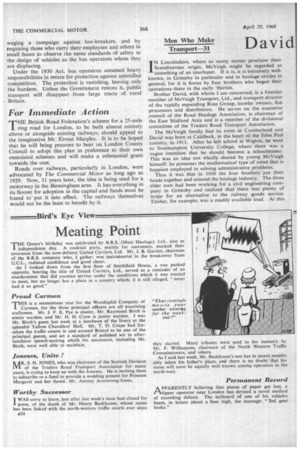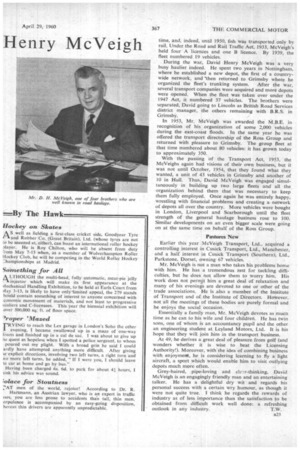Men Who Make Transport-31
Page 30

Page 31

If you've noticed an error in this article please click here to report it so we can fix it.
David Henry McVeigh
IN Lincolnshire, where so many names proclaim their Scandinavian origin, McVeigh might be regarded as something of an interloper. If it is, it is extremely wellknown, in Grimsby in particular and in haulage circles in general, for it is borne by four brothers who began their operations there in the early 'thirties.
Brother David, with whom I am concerned, is a founder member of McVeigh Transport, Ltd., and transport director of the rapidly expanding Ross Group, trawler owners, fish processors and distributors. He serves on the executive council of the Road Haulage Association, is chairman of the East Midland Area and is a member of the divisional committee of the Traders Road Transport Association.
The McVeigh family had its roots in Cumberland and David was born at Caldbeck, in the heart of the John Peel country, in 1911. After he left school at Wigton, he went to Southampton University College, where there was a vague intention that he should become a schoolmaster. This was an idea not wholly shared by young McVeigh himself: he possesses the mathematical type of mind that is happiest employed in solving administrative problems.
Thus it was that in 1930 the four brothers put their heads together and entered the haulage industry. The three elder men had been working for a civil engineering company in Grimsby and realized that there was plenty of scope for an alternative to the railway goods service. Timber, for example, was a readily available load. At this time, and, indeed, until 1950, fish was transported only by rail. Under the Road and Rail Traffic Act, 1933, McVeigh's held four A licences and one B licence. By 1939, the fleet numbered 19 vehicles.
During the war, David Henry McVeigh was a very busy haulier indeed. He spent two years in Nottingham, where he established a new depot, the first of a countrywide network, and "'then returned to Grimsby where he organized the fleet's trunking system. After the War, several transport companies were acquired and more depots were opened. When the fleet was taken over under the 1947 Act, it numbered 37 vehicles. The brothers were separated, David going to Lincoln as British Road Services district manager, the others remaining with B.R.S. in Grimsby.
In 1953, Mr. McVeigh was awarded the M.B.E. in recognition of his organization of some 2,000 vehicles during the east-coast floods. In the same year he was offered the transport directorship of the Ross Group and returned with pleasure to Grimsby. The group fleet at that time numbered about 80 vehicles: it has grown today to approximately 350.
With the passing of the Transport Act, 1953, the McVeighs again had visions of their own business, but it was not until October, 1954, that they found what they wanted, a unit of 43 Vehicles in Grimsby and another of 10 in Hull. Thus, David McVeigh was engaged simultaneously in building up two large fleets and all the organization behind them that was necessary to keep them fully employed. Once again he was entirely happy, wrestling with financial problems and creating a network of depots all over the country. More vehicles were bought in London, Liverpool and Scarborough until the fleet strength of the general haulage business rose to 100. Similar developments on an even bigger scale were going on at the same time on behalf of the Ross Group.
Pastures New
Earlier this year McVeigh Transport, Ltd., acquired a controlling interest in Cusick Transport, Ltd., Manchester, and a half interest in Cusick Transport (Southern), Ltd., Parkstone, Dorset, owning 67 vehicles.
• Mr. McVeigh is not a man who takes his problems home with him. He has a tremendous zest for tackling difficulties, but he does not allow them to worry him. His work does not permit him a great deal of relaxation and many of his evenings are devoted to one or other of the trade associations. He is also a member of the Institute of Transport and of the Institute of Directors. However. not all the meetings of these bodies are purely formal and he enjoys the social occasion.
Essentially a family man, Mr. McVeigh devotes as mucn time as he can to his wife and four children. He has twin sons, one of whom is an accountancy pupil and the other an engineering student at Leyland Motors, Ltd. It is his hope that they will join him in the transport business.
At 49, he derives a great deal of pleasure from golf (and wonders whether it is wise to beat the Licensing Authority!). Moreover, with the idea of combining business with en joymenot, he is considering learning to fly a light aircraft, a sport which would enable him to visit outlying depots much more often.
Grey-haired, pipe-loving and cle r-thinking, David McVeigh is an engagingly friendly man and an entertaining talker. He has a delightful dry wit and regards his personal success with a certain wry humour, as though it were not quite true. I think he regards the rewards of industry as of less importance than the satisfaction to be obtained from difficult work well done: a refreshing outlook in any industry. T.W.












































































































